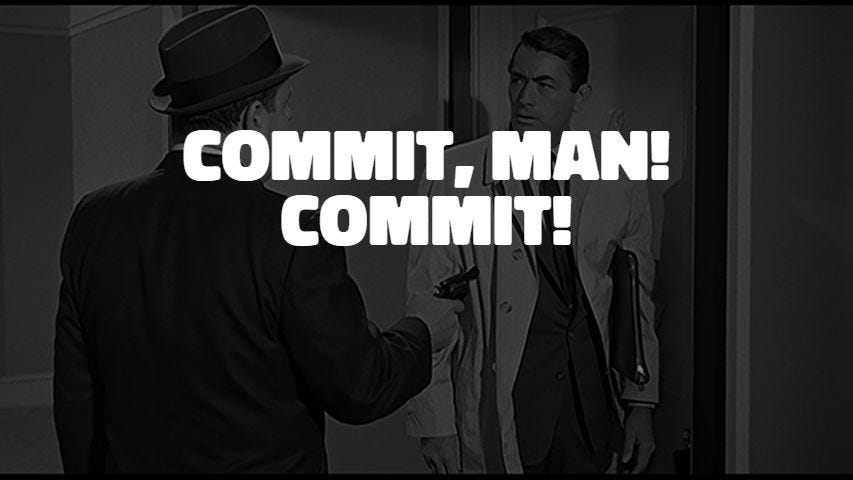Commit, man! Commit!

At the end of the stunningly intelligent 1965 movie, “Mirage,” David Stillwell (played by Gregory Peck) has a climactic encounter with the man behind the curtain. The scene reaches the point where men must make life or death decisions. But there is one neutral figure in the scene who still has the potential of changing the entire predicament in one or the other direction. At that moment, David Stillwell looks at this neutral character named Josephson, and he says with indignation:
“Dammit, Josephson, commit! If you’re not committed to anything, you’re just taking up space!”
It was one of the most striking explorations into manhood I’ve come across in a long time. Paul Maxwell in his fascinating article over at Theopolis Institute argues that man’s greatest challenges today are “suicide, alcohol, drugs, and obesity.” There is much merit to these and I can second his profound philosophical analysis that under-girds his premise, but I cannot think of something as profoundly needful in modern evangelical men than the ability to commit to ideas and principles.
An uncommitted man buries his convictions for fear of the consequences. He prefers to play along in the game of “you-go-first,” which generally means that by the end, he will find his commitment to anything unworthy of committing wholeheartedly. We have all seen the young man who is zealous (perhaps over-zealous) about everything and our first reaction is to criticize his zeal. “How dare he commit so youthfully!” But we should encourage his zeal and praise him for his commitment to his principles and then seek to moderate his commitments to Scripture first, tradition second, and experience third.
The uncommitted Josephsons’ carry with them an enormous guilt for looking back and saying, “I should have said something,” or “Why didn’t I speak up?” I should mention that I am not speaking of sharing your opinion about everything under the sun, because then you’d be a committed nuisance. But I am stressing the need to find a committed dogma that allows you to think about the world carefully.
Commitment is not the same as tyranny. Commitment in its biblical context is leading with wisdom and determination. Perhaps there was a time where commitment was not as necessary, but we can no longer afford to make mild assertions about life. Theological neutrality is as possible as kale ice cream.
If the crop of men in churches today cannot commit steadily and consistently to ideologies that formed the Church of old and gives hope for the modern church, we will see weak men following the wind to whatever ideologies and trends come their way. In the end, they will just take up space!
The post Commit, man! Commit! appeared first on Kuyperian Commentary.

